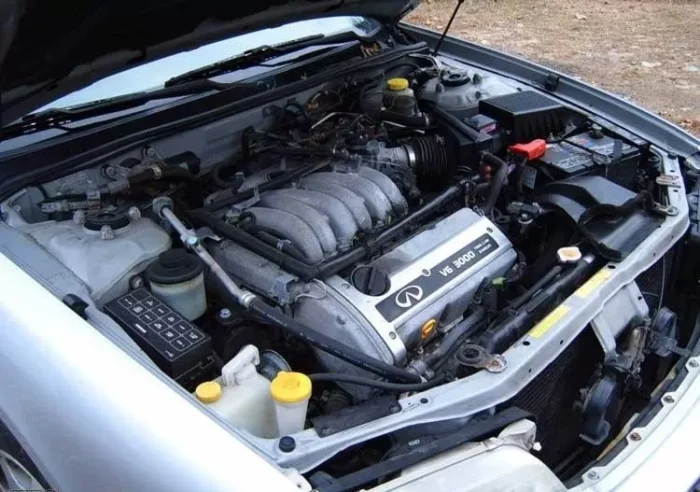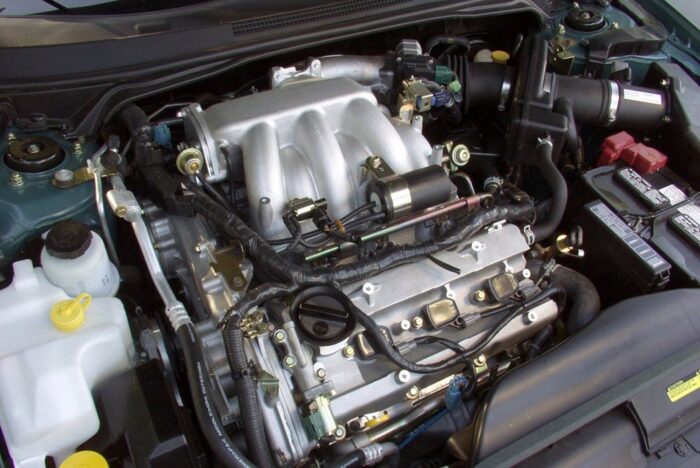The Nissan VQ30DE engine is a powerful and reliable engine that powers a range of Nissan vehicles. First introduced in 1995, it quickly gained popularity due to its impressive power output, smooth operation, and durability. However, like all engines, it is not immune to problems, which can affect its reliability and performance.
In this article, we will explore some of the most common Nissan VQ30DE engine problems and discuss ways to avoid them. We will also take a closer look at the engine’s reliability, so you can decide if it’s the right choice for your vehicle.
Engine specifications for Nissan VQ30DE 3.0 l
First modification 1994 model
| Displacement | 2987 cc |
| Power system | Distributor Injection System |
| Engine power | 190 – 220 hp |
| Torque | 270 – 280 Nm |
| Cylinder block | Aluminum V6 |
| Cylinder head | Aluminum 24v |
| Cylinder diameter | 93 mm |
| Stroke | 73.3 mm |
| Compression ratio | 10 |
| Engine features | ECCS, NDIS |
| Hydraulic compensators | No |
| Timing Chain/Belt | Chain |
| Variable Valve Timing (VVT) | No |
| Turbocharger | No |
| Oil capacity/Recommended oil | 4.0 l 5W-30 |
| Fuel type | Medium/Plus |
| Euro class | EURO 2/3 |
| Average lifespan | 350 000 km |
2000 model modification or VQ30DE-K
| Displacement | 2987 cc |
| Power system | Distributor Injection System |
| Engine power | 220 – 230 hp |
| Torque | 290 – 300 Nm |
| Cylinder block | Aluminum V6 |
| Cylinder head | Aluminum 24v |
| Cylinder diameter | 93 mm |
| Stroke | 73.3 mm |
| Compression ratio | 10 |
| Engine features | ECCS, NDIS |
| Hydraulic compensators | No |
| Timing Chain/Belt | Chain |
| Variable Valve Timing (VVT) | No |
| Turbocharger | No |
| Oil capacity/Recommended oil | 4.0 l 5W-30 |
| Fuel type | Medium/Plus |
| Euro class | EURO 4/5 |
| Average lifespan | 330 000 km |
The Nissan VQ30DE engine oil capacity, recommended oil type, and oil change intervals
| Engine Oil Capacity | Recommended Oil Type | Oil Change Interval |
|---|---|---|
| 4.5 quarts (4.3 liters) | 5W-30 or 10W-30 | Every 5,000 miles or 6 months |
It is important to note that the oil change interval can vary depending on the driving conditions and usage of the vehicle. For example, if you frequently drive in dusty or dirty conditions, you may need to change your oil more frequently. Additionally, if you frequently engage in high-performance driving or towing, you may need to change your oil more frequently as well.
It is always best to refer to your vehicle’s owner manual for specific recommendations on oil change intervals and the type of oil to use. By following the manufacturer’s recommendations and performing regular oil changes, you can help ensure the long-term health and reliability of your Nissan VQ30DE engine.

What cars use the VQ30DE
| Cefiro 2 (A32) | 1994 – 2000 |
| Cefiro 3 (A33) | 1998 – 2004 |
| Maxima 4 (A32) | 1994 – 2000 |
| Maxima 5 (A33) | 1999 – 2006 |
| Cedric 9 (Y33) | 1995 – 1999 |
| Gloria 10 (Y33) | 1995 – 1999 |
| Presage 1 (U30) | 1998 – 2003 |
| Bassara 1 (JU30) | 1999 – 2003 |
| I30 1 (A32) | 1995 – 1999 |
| I30 2 (A33) | 1999 – 2001 |
| SM5 1 (A32) | 1998 – 2005 |
Nissan VQ30DE Engine Problems and How to Avoid Them
Oil Leaks: Causes and Symptoms
Causes:
- Worn out oil pan gasket
- Cracked oil filter adapter
- Damaged oil cooler seal
Symptoms:
- Low oil pressure
- Oil puddles under the vehicle
- Burning oil smell
Timing Chain Tensioner Failure: Causes and Symptoms
Causes:
- Worn out tensioner
- Low oil pressure
Symptoms:
- Engine knocking noise
- Rough idling
- Decreased engine performance
Coolant Leaks: Causes and Symptoms
Causes:
- Leaking radiator
- Blown head gasket
- Cracked engine block
Symptoms:
- Overheating engine
- Low coolant level
- Sweet-smelling exhaust fumes
Ignition Coil Failure: Causes and Symptoms
Causes:
- High voltage surges
- Overheating
Symptoms:
- Engine misfires
- Decreased engine performance
- Illuminated check engine light
Oxygen Sensor Failure: Causes and Symptoms
Causes:
- Contaminated sensor
- Damaged sensor wires
Symptoms:
- Illuminated check engine light
- Decreased fuel economy
- Rough idling
Maintenance
The table outlining the maintenance intervals and estimated cost for the Nissan VQ30DE engine:
| Maintenance Task | Interval | Estimated Cost |
|---|---|---|
| Oil Change | Every 5,000 miles or 6 months | $40 – $100 |
| Air Filter Replacement | Every 30,000 miles | $15 – $50 |
| Spark Plug Replacement | Every 105,000 miles | $80 – $150 |
| Timing Belt Replacement | Every 105,000 miles | $500 – $800 |
| Coolant Flush | Every 60,000 miles | $100 – $150 |
It is important to note that the estimated cost can vary depending on the location, mechanic, and other factors. Additionally, the cost of the timing belt replacement can vary significantly depending on the specific vehicle and the amount of labor involved.
It is always best to refer to your vehicle’s owner manual for specific recommendations on maintenance tasks and intervals. By following the manufacturer’s recommendations and performing regular maintenance, you can help ensure the long-term health and reliability of your Nissan VQ30DE engine while also potentially avoiding costly repairs in the future.

Frequently Asked Questions about Nissan VQ30DE Engine Problems and Reliability
What is the average lifespan of a Nissan VQ30DE engine?
The average lifespan of a Nissan VQ30DE engine is approximately 150,000 to 200,000 miles with proper maintenance and care.
Is the Nissan VQ30DE engine prone to oil leaks?
Yes, the Nissan VQ30DE engine is known to develop oil leaks over time, especially around the oil pan gasket, oil cooler seal, and oil filter adapter.
Can I prevent timing chain tensioner failure in my Nissan VQ30DE engine?
Yes, you can prevent timing chain tensioner failure by ensuring that your engine always has adequate oil pressure, performing regular oil changes, and inspecting the timing chain tensioner regularly.
What is the cost of replacing the ignition coils in a Nissan VQ30DE engine?
The cost of replacing the ignition coils in a Nissan VQ30DE engine varies depending on the mechanic and location, but it can range from $200 to $500.
Should I avoid buying a car with a Nissan VQ30DE engine
No, the Nissan VQ30DE engine is generally considered to be a reliable engine, as long as it is well-maintained and serviced regularly.
0 Comments